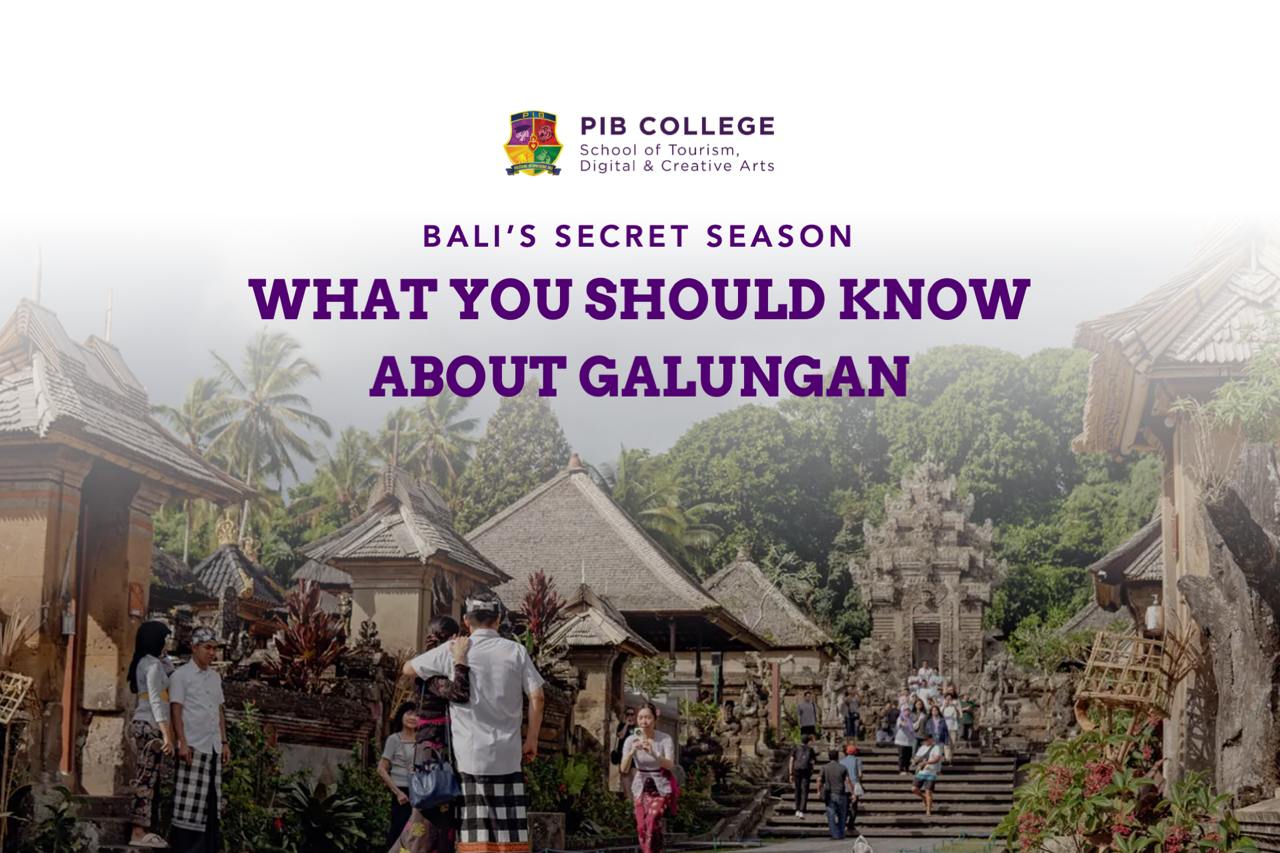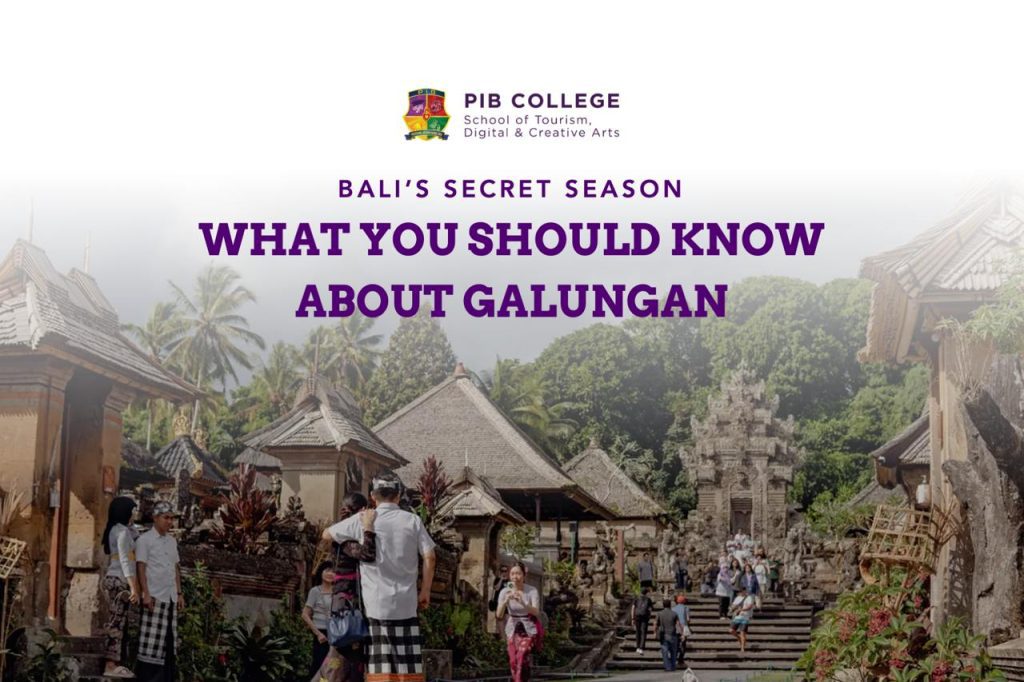
You just landed in Bali. Got your promo ticket, your itinerary is Pinterest-perfect, and your camera’s all set to catch the golden sunset at Tanah Lot or stroll through artsy Ubud. But then—plot twist!—everything’s weirdly quiet. Streets are nearly empty, shops are closed, and the whole vibe feels… mellow. Congrats, you’ve arrived during Galungan.
If you’ve never heard of it, no worries. Galungan is a major holiday for Hindus in Bali. But don’t expect fireworks, EDM, or wild parades. This is a deeply sacred time—full of rituals, tradition, and meaning. And if you come here totally clueless, you might feel like your vacay’s been “cancelled by the universe” ‘cause your fave places are all closed.
So before you start rage-posting on IG, here’s the lowdown on Galungan—what it’s all about and how to actually enjoy Bali during this magical time.
- Galungan = The Victory of Good vs Evil (Spiritual Edition)
Galungan is the celebration of dharma (good) beating adharma (evil). It’s the day when Balinese Hindus believe ancestral spirits return to visit their families. People pray at temples and home shrines, and they prepare tons of offerings (called banten) to honor and thank their ancestors.
It happens once every 210 days (yup, according to the Balinese calendar) and always falls on a Wednesday. You’ll start noticing the vibe shift 2–3 days before the actual day. So if Bali feels like it suddenly switched to “Zen Mode,” now you know why.
- Lots of Places Are Closed—Even the Cute Warungs and Tourist Spots
Planning to hit up cute cafes, shop for souvenirs, or visit that hidden waterfall you saw on TikTok? Plot twist number two: many of them might be closed.
From local food joints to full-on tourist attractions—even online transport services can slow down. Why? Because everyone’s heading back to their hometowns to be with family and take part in ceremonies.
Pro tip? Don’t panic. Just plan ahead! Check which spots are open, or take this time to chillax—maybe do a peaceful staycation and soak in Bali’s calm, soulful side.
- Those Gorgeous Bamboo Arches? They’re Called Penjor (and They’re Not Just for the ‘Gram)
You’ll see tall, beautifully decorated bamboo poles lining the streets. These are penjor—a super meaningful spiritual symbol. They represent mountains, prosperity, and gratitude to the gods.
Each penjor is a work of art, with details made of coconut leaves, fruits, and symbols of fertility and balance. They’re not just decorations—they’re part of sacred rituals.
And hey, just a friendly PSA: don’t touch them, lean on them, or treat them like your next TikTok backdrop. Respect them like you would religious icons anywhere else, cool?
- Traffic Gets Wild in the Villages
A few days before and on Galungan itself, traffic in villages can get, uh… interesting. People are going back home, heading to temples, carrying offerings, or joining processions.
If you’re renting a scooter or car, plan ahead. Avoid peak hours (usually morning to noon) and steer clear of routes that pass major temples. Unless you really like being stuck in spiritual traffic jams.
- Ceremonies Are Not Tourist Shows
Yes, they’re stunning. Yes, the outfits and rituals look straight out of a movie. But no, this isn’t a cultural photoshoot for your Reels.
If you’re lucky enough to witness a ceremony, observe respectfully. Stay at a distance, don’t use flash, and don’t stand in the path of the procession. Want to take a pic? Ask first. Manners are sexy.
- Dress the Part If You Visit a Temple
Temples get packed during Galungan. If you’re curious and want to visit one, make sure you dress respectfully.
That means a sarong (kamen), a sash (selendang), and a top that covers your shoulders. Some temples rent or lend them, but it’s better to bring or rent your own. Trust us—you’ll look great and earn major points for respecting the culture.
- Bali’s Vibe Hits Different—In the Best Way
Normally buzzing with beach clubs and scooters, Bali becomes calm and spiritual during Galungan. Penjor line the roads, gamelan music echoes softly, and incense fills the morning air.
It’s the perfect moment to pause, reflect, learn about Balinese culture—or just vibe out. Some travelers even choose to visit during Galungan just to feel this rare, peaceful energy.
Bonus Round: Don’t Miss Kuningan!
Ten days after Galungan comes Kuningan Day—the moment when ancestral spirits return to the heavens. The vibe is joyful again, with yellow-themed offerings and more temple visits.
Still in Bali by then? Lucky you. It’s the sweet ending to a beautiful cultural journey.
More Than Just a Holiday—It’s a Lesson in Respect
Galungan isn’t just a religious celebration. It’s Bali showing you its true colors—spiritual, loving, and deeply connected to nature and ancestry.
So don’t stress if your itinerary hits a few bumps. This is your golden chance to go beyond the tourist experience and really feel what makes Bali magical.
Who knows? This might be the part of your trip you remember forever.
Thinking of Getting Deeper Into Bali’s Culture (and Maybe Even the Tourism Industry)?
If this spiritual side of Bali inspires you, maybe it’s time to go pro. At PIB College, you can study right in the heart of Indonesia’s tourism world. Whether you’re into Hotel Management, Event Planning, Digital Business, or Culinary Arts—you’ll get hands-on learning, modern facilities, and even internships abroad.
Who knows? Maybe next Galungan, you’ll be here not as a tourist, but as part of your life-changing journey in Bali!
Author: Stephanie Gunawan

